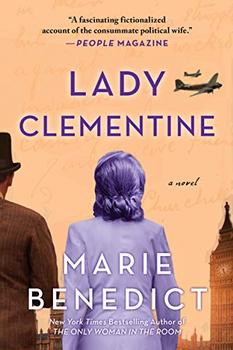Summary | Excerpt | Reading Guide | Reviews | Beyond the Book | Read-Alikes | Genres & Themes | Author Bio

This article relates to Lady Clementine
 Clementine Churchill is best known as the wife of Winston Churchill, who held the office of British Prime minister during (1940-1945) and after (1951-1955) World War II. However, as is shown in Marie Benedict's novel Lady Clementine, while Clementine supported and assisted her husband in his governing endeavors, she held her own political opinions and was politically and socially active in her own right.
Clementine Churchill is best known as the wife of Winston Churchill, who held the office of British Prime minister during (1940-1945) and after (1951-1955) World War II. However, as is shown in Marie Benedict's novel Lady Clementine, while Clementine supported and assisted her husband in his governing endeavors, she held her own political opinions and was politically and socially active in her own right.
Clementine (pronounced "Clemen-teen"), who was born in 1885, experienced an unstable childhood due to various losses and upheavals. Her parents, Sir Henry Montague Hozier and Lady Blanche Hozier, were aristocrats notorious for their numerous affairs, which left doubt as to whether Henry was actually Clementine's father. Henry divorced Blanche when Clementine was six years old, leaving his ex-wife with the children, though later on he made a (failed) attempt to kidnap Clementine. Blanche's social status suffered and she had ongoing financial problems. Partially to escape creditors, she moved the family multiple times. As a result of these moves, Clementine lacked a sense of stability, and was further unmoored when her older sister, Kitty, died of typhoid fever in 1900.
It was at a dance in 1904 that Clementine first met Winston Churchill, who at the time was a member of parliament. They didn't hit it off immediately; Clementine had heard that Winston was "stuck-up" and he did little to disabuse her of that notion, never asking her to dance or attempting to engage her in conversation. She saw him again four years later at a dinner party, where they got along much better. Clementine married Winston only a few months after this second meeting, and they eventually had five children together.
Clementine played a large part in Winston's political career. After his reputation suffered as a result of the failed Gallipoli Campaign of World War I, she was supportive of his decision to quit government and serve at the front himself, a move that was significant in rebuilding his public image. She also helped and influenced him in numerous other ways, regularly advising him on various issues and engaging in diplomatic efforts with leaders from other nations. According to biographer Sonia Purnell, author of Clementine: The Life of Mrs. Winston Churchill, Clementine once suggested that she would have liked to be involved in politics in an official capacity herself if she had "been born with trousers rather than petticoats."
Despite the limitations Clementine was up against as a woman, she became directly involved in many social causes, eventually taking charge of public assistance initiatives to the point of giving instructions to government ministers. During WWI, she collaborated with the YMCA in London to arrange canteen service for munitions workers. In the midst of WWII, she took advantage of her position, now as the wife of the prime minister, to continue her aid work, serving as chairman of the Maternity Hospital for the Wives of Officers and the Red Cross Aid to Russia Fund. She also served as president for the Young Women's Christian Association War Time Appeal.
She held her own political views, and despite her backing of Winston and his career, generally did not seem afraid to oppose him. She was more liberal than her husband, showing strong working-class sympathies and clashing with him on issues such as women's suffrage, which she actively supported from early on in their marriage.
Lady Clementine received many honors and awards for her aid work over the years, including the title of Dame Grand Cross of the Order of the British Empire in 1946. She also received honorary degrees from Oxford University, the University of Glasgow and the University of Bristol. In her old age, she was made a life peer as Baroness Spencer-Churchill of Chartwell, where the Churchills had a country home. She died in London in 1977.
Clementine Churchill in 1915
Filed under People, Eras & Events
![]() This "beyond the book article" relates to Lady Clementine. It originally ran in February 2020 and has been updated for the
July 2020 paperback edition.
Go to magazine.
This "beyond the book article" relates to Lady Clementine. It originally ran in February 2020 and has been updated for the
July 2020 paperback edition.
Go to magazine.
Your guide toexceptional books
BookBrowse seeks out and recommends the best in contemporary fiction and nonfiction—books that not only engage and entertain but also deepen our understanding of ourselves and the world around us.